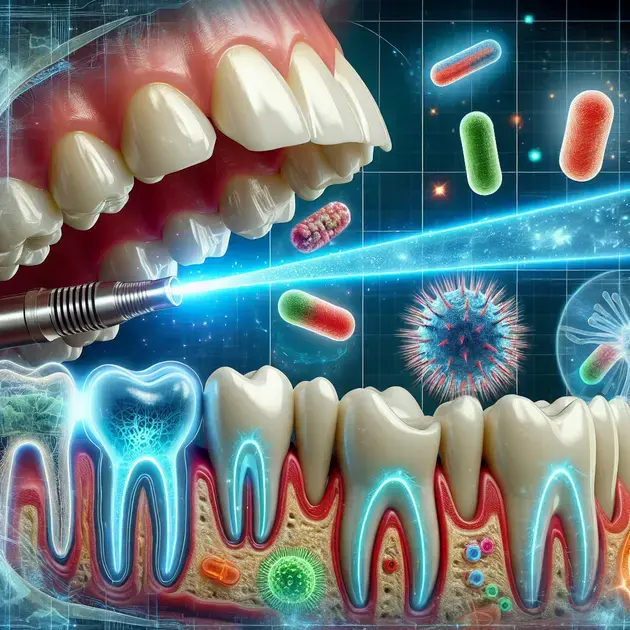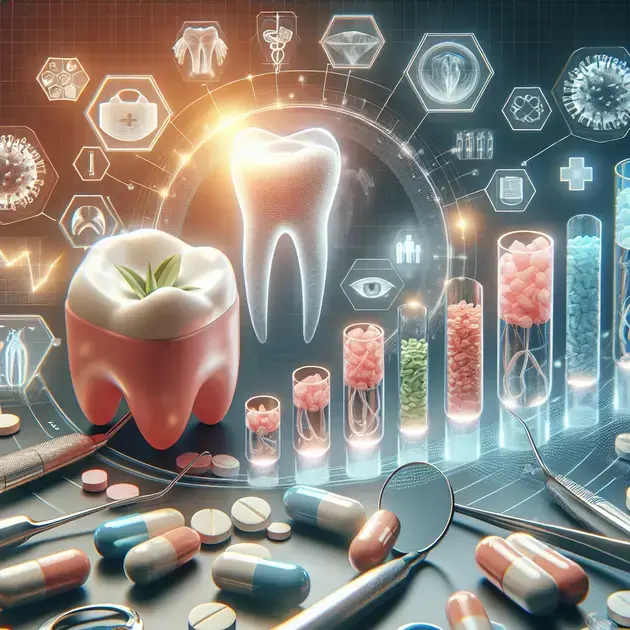In today’s advanced dental care landscape, finding an effective medication for periodontitis treatment is crucial for maintaining oral health. Periodontitis, a severe gum infection that damages the soft tissue and destroys the bone that supports your teeth, requires professional intervention and proper medication to prevent further complications.
Recent studies have shown promising results with the use of antibiotic medications in conjunction with traditional periodontal treatments for combating periodontitis effectively. By targeting the underlying bacterial infection, these medications can help reduce inflammation, control the spread of infection, and support the healing process when administered as part of a comprehensive treatment plan.

Effective Treatment Approaches for Periodontitis
Periodontitis is a serious gum infection that damages the soft tissue and destroys the bone that supports your teeth. It can lead to tooth loss if left untreated. To effectively treat periodontitis, a combination of professional dental treatments and at-home care is usually recommended. Here are some effective treatment approaches:
1. Scaling and Root Planing:
One of the most common treatments for periodontitis is scaling and root planing. This deep cleaning procedure removes plaque and tartar from the teeth and roots, helping to reduce inflammation and promote healing. You can find more information about this treatment on the Colgate website.
2. Antibiotic Therapy:
Antibiotics may be prescribed to help control bacterial infections in the gums. Common antibiotics used for periodontitis include doxycycline and metronidazole. It’s important to follow your dentist’s instructions and complete the full course of antibiotics. More information on antibiotic therapy can be found on the American Academy of Periodontology website.
3. Surgery:
In severe cases of periodontitis, surgery may be necessary to repair the damage and restore gum health. Procedures such as flap surgery, bone grafts, and tissue regeneration can help save teeth and prevent further progression of the disease. You can learn more about periodontal surgeries on the Mouth Healthy website by the American Dental Association.
4. Ongoing Maintenance:
Once your periodontitis is under control, maintaining good oral hygiene is essential to prevent recurrence. Brushing twice a day, flossing daily, and regular dental check-ups are key to keeping your gums healthy. You can download the “Dental Care” app from the App Store or Google Play Store for personalized oral care tips and reminders.
5. Lifestyle Changes:
Quit smoking, eat a balanced diet rich in fruits and vegetables, and manage stress to support your overall health and improve your gum health. The “Healthy Habits” app offers guidance on making positive lifestyle changes to benefit your oral health.
The Role of Antibiotics in Periodontitis Management
In some cases of periodontitis, antibiotics play a crucial role in managing the infection and promoting healing. Antibiotics can help control the bacterial growth in the gums and reduce inflammation. Here’s how antibiotics are used in periodontitis management:
1. Prescription Antibiotics:
Your dentist may prescribe antibiotics such as amoxicillin, azithromycin, or clindamycin to supplement your periodontal treatment. These antibiotics help eliminate the bacteria causing the infection and support the healing process. Follow your dentist’s instructions on dosage and duration. More information on prescription antibiotics can be found on the National Center for Biotechnology Information website.
2. Topical Antibiotics:
In some cases, topical antibiotics in the form of mouth rinses or gels may be recommended to target specific areas of infection in the gums. These topical treatments can be applied directly to the affected areas for localized treatment. Your dentist can provide guidance on how to use these antibiotics effectively. You can find more information about topical antibiotic treatments on the PubMed website.
3. Antibiotic Resistance:
It’s important to use antibiotics judiciously in periodontitis management to prevent antibiotic resistance. Avoid self-medicating with antibiotics and always consult your dentist for proper diagnosis and treatment. The “Antibiotic Guide” app provides information on antibiotic resistance and proper antibiotic use in dental care.
4. Combination Therapy:
Combining antibiotics with other periodontal treatments such as scaling and root planing or surgery can enhance the effectiveness of the overall treatment plan. Your dentist will tailor a comprehensive treatment approach to address your specific needs and ensure successful management of periodontitis. The “Dentist Pro” app offers insights into various combination therapies for periodontitis management.
Creating a Comprehensive Medication Plan for Periodontitis
A comprehensive medication plan for periodontitis involves a personalized approach to managing the infection and supporting gum health. Medications such as antibiotics, antimicrobial mouth rinses, and pain relievers may be prescribed as part of the treatment. Here’s how you can create a comprehensive medication plan for periodontitis:
1. Consultation with a Dental Professional:
It’s essential to consult with a dental professional, such as a periodontist or general dentist, to develop a medication plan tailored to your specific condition. A thorough examination and assessment of your oral health will help determine the most appropriate medications for your treatment. You can schedule a consultation with a dental professional through the “Dentist Finder” app.
2. Prescription Medications:
Your dentist may prescribe medications such as antibiotics, antimicrobial mouth rinses (e.g., chlorhexidine), or pain relievers to manage the infection and alleviate symptoms. It’s important to follow the prescribed dosage and usage instructions to maximize the effectiveness of the medications. The “Medication Tracker” app can help you stay organized with your medication schedule and reminders.
3. Ongoing Monitoring and Adjustments:
As you progress through your treatment plan, your dental professional will monitor your response to the medications and make any necessary adjustments. Regular follow-up appointments are essential to track your progress, address any concerns, and optimize the medication plan for better outcomes. The “Dental Care Tracker” app allows you to record your symptoms and communicate with your dental professional for ongoing monitoring.
4. Adherence to the Medication Plan:
Adherence to the prescribed medication plan is key to the success of your periodontitis treatment. Make sure to take your medications as directed, complete the full course of antibiotics if prescribed, and use antimicrobial mouth rinses as recommended. The “Medication Adherence” app provides tools and resources to help you stay on track with your medication regimen.
5. Lifestyle Modifications:
In addition to medications, incorporating healthy lifestyle habits such as regular exercise, stress management, and a balanced diet can support your overall health and improve the effectiveness of your medication plan. The “Healthy Living” app offers tips on lifestyle modifications for better oral and overall health.

Key Considerations for Effective Periodontitis Medication
When it comes to selecting the most effective medication for treating periodontitis, there are several key considerations that should be taken into account. One important factor to consider is the severity of the patient’s condition. Depending on the stage of periodontitis and the extent of damage to the gums and supporting structures, different medications may be more suitable.
Another important consideration is the potential side effects of the medication. Some periodontitis medications can cause adverse reactions in certain individuals, so it is crucial to assess the patient’s medical history and any known allergies before prescribing a particular medication.
Furthermore, the mode of administration of the medication is also a key consideration. Some periodontitis medications are available in the form of mouth rinses, while others may need to be applied directly to the affected area. The patient’s ability to comply with the prescribed regimen should be taken into account when selecting the most appropriate medication.
It is also important to consider the cost of the medication, as some of the more advanced and effective treatments for periodontitis can be costly. Patients should be informed of the financial implications of the prescribed medication and any potential alternatives that may be more affordable.
In conclusion, when choosing the most effective medication for treating periodontitis, healthcare providers should carefully consider the severity of the condition, potential side effects, mode of administration, and cost. By taking these key considerations into account, patients can receive the most appropriate and beneficial treatment for their periodontal disease.
The Impact of Antibiotic Therapy on Periodontitis Treatment
Antibiotic therapy plays a crucial role in the treatment of periodontitis, especially in cases where the infection is severe or has not responded to conventional treatments. The use of antibiotics can help to reduce the levels of harmful bacteria in the gums and promote healing of the affected tissues.
One key impact of antibiotic therapy on periodontitis treatment is its ability to target specific strains of bacteria that are known to be associated with gum disease. By using antibiotics that are effective against these bacteria, healthcare providers can improve the outcomes of treatment and reduce the risk of recurrence.
Another important impact of antibiotic therapy is its ability to reduce inflammation in the gums. Inflamed gums are a common symptom of periodontitis, and antibiotics can help to decrease the inflammation and discomfort experienced by patients.
It is essential to consider the potential side effects of antibiotic therapy, as these medications can cause adverse reactions in some individuals. Healthcare providers should carefully monitor patients who are undergoing antibiotic treatment for periodontitis and adjust the regimen as needed to minimize any negative effects.
In summary, antibiotic therapy can have a significant impact on the treatment of periodontitis by targeting specific bacteria, reducing inflammation, and promoting healing. When used appropriately and in conjunction with other treatments, antibiotics can be an effective tool in the management of gum disease.
Optimizing Periodontitis Management with Advanced Medication Solutions
Advanced medication solutions have revolutionized the management of periodontitis, offering more targeted and effective treatments for patients with gum disease. These innovative medications can help to address the root causes of periodontitis and promote better outcomes in terms of gum health and overall oral hygiene.
One key benefit of advanced medication solutions is their ability to target specific pathogens that are responsible for causing periodontitis. By using medications that specifically attack these harmful bacteria, healthcare providers can more effectively control the progression of the disease and prevent further damage to the gums and supporting structures.
Another advantage of advanced medication solutions is their potential for long-lasting effects. Some medications can provide sustained release of active ingredients, ensuring continuous protection against bacterial growth and inflammation in the gums over an extended period of time.
Advanced medication solutions also offer improved convenience and compliance for patients. With options such as easy-to-use mouth rinses or gels, patients can more easily incorporate their medication into their daily oral hygiene routines, leading to better adherence to the prescribed treatment regimen.
In conclusion, the optimization of periodontitis management with advanced medication solutions represents a significant advancement in the field of dental care. By leveraging the benefits of these innovative treatments, healthcare providers can enhance the quality of care for patients with gum disease and achieve better long-term outcomes in terms of oral health.
Conclusion
Effective medication selection for periodontitis treatment involves considering the severity of the condition, potential side effects, mode of administration, and cost. By carefully evaluating these factors, healthcare providers can offer patients suitable and beneficial treatments for their gum disease, ensuring optimal outcomes and patient satisfaction.
Antibiotic therapy plays a pivotal role in periodontitis treatment by targeting specific bacteria strains, reducing inflammation, and promoting tissue healing. Healthcare providers must monitor for potential side effects and adjust treatment regimens as necessary to maximize the benefits of antibiotics in managing gum disease effectively.
Advanced medication solutions have transformed periodontitis management by addressing root causes, targeting specific pathogens, ensuring prolonged effects, and enhancing patient convenience and compliance. By leveraging these innovative treatments, healthcare providers can elevate the quality of care for individuals with gum disease, leading to improved long-term oral health outcomes.



